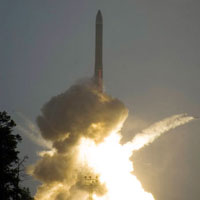Putin Suggests Information Exchange on Missile Defense
Putin's comment, made at a press briefing in the far eastern Russian city of Vladivostok, echoed a similar call from Russian President Dmitry Medvedev last week.

"If we want to retain the balance, we have to establish an exchange of information: Let the U.S. partners provide us information on [their] missile defense while we will give them information on [our] offensive weapons," Putin said.
Putin also spoke positively about ongoing negotiations between the two countries on a new nuclear arms control agreement that would replace the U.S.-Russian START treaty, which expired December 5 , CNN reports .
The New York Times quoted Mr. Putin as saying, “The balance will be disrupted, and then they will do whatever they want, and aggressiveness will immediately arise both in real politics and economics.”
To preserve the balance, he said, Russia must develop new offensive weapons to counter the missile shield — or the United States must provide Russia with data on its missile defense plans in exchange for data on Russian weapons development.
It was not clear whether Mr. Putin’s comments, which were widely reported in the Russian news media, reflected a new Russian position or a negotiating tactic in the final stages of the Start talks, which American officials have said are close to a conclusion.
But Mr. Putin’s comments came three weeks after negotiators missed the Dec. 5 deadline for replacing Start, and appeared to reflect a lasting skepticism in Russia about American intentions, almost a year after Vice President Joseph R. Biden Jr. announced that it was time for the two countries to “press the reset button.”While President Obama has impressed Russian leaders, many question whether he is capable of changing Washington’s policies toward Russia, said Dmitri V. Trenin, director of the Carnegie Moscow Center, The New York Times reports.
News agencies also reported, under a joint understanding signed in July, deployed nuclear warheads should be cut to fewer than 1,700 on each side within seven years of a new treaty - a huge cut on Soviet-era levels.
Nonetheless, between them the two countries will retain enough firepower to destroy the world several times over.
The BBC's Rupert Wingfield-Hayes in Moscow says that Russia's nuclear arsenal is the only part of its military that remains world-class, and therefore it fears that it could be disadvantaged by cuts to nuclear capability.
Mr Putin's comments could be a negotiating ploy, rather than a reversal of Russia's commitment to a treaty, our correspondent says.
Analysts in Moscow think what Mr Putin really wants is a commitment from Washington to only deploy a small-scale missile defence system, that would be effective against Iran and North Korea but would not neutralise Russia's nuclear missile force, he adds, BBC News reports.
Subscribe to Pravda.Ru Telegram channel, Facebook, RSS!


